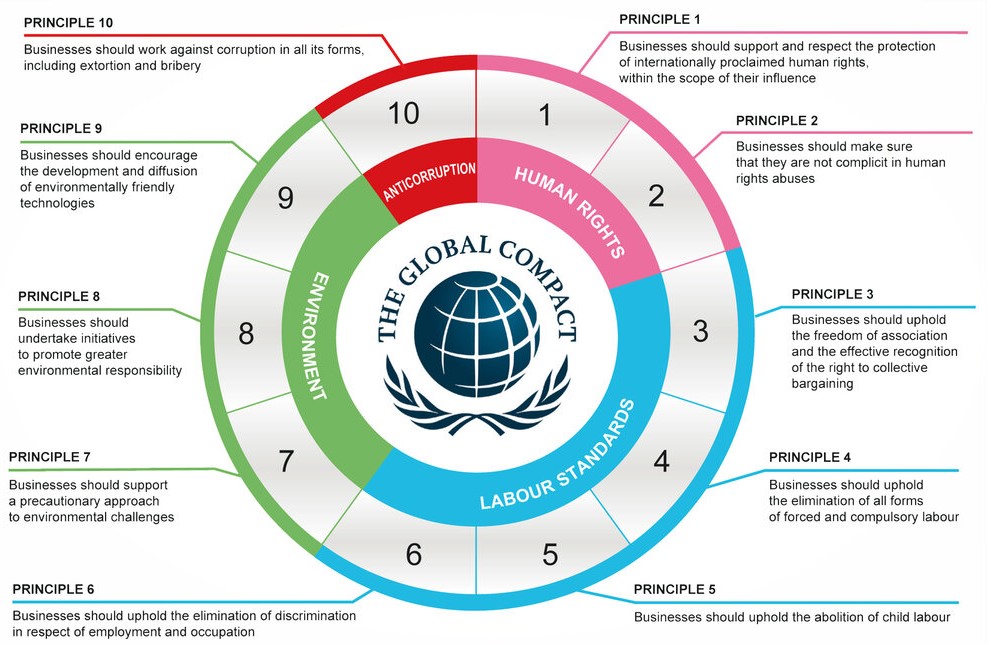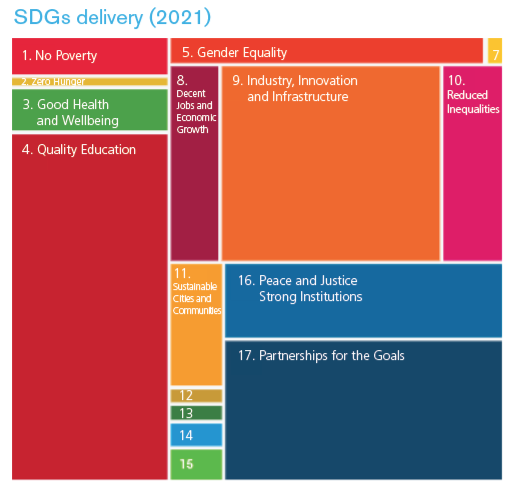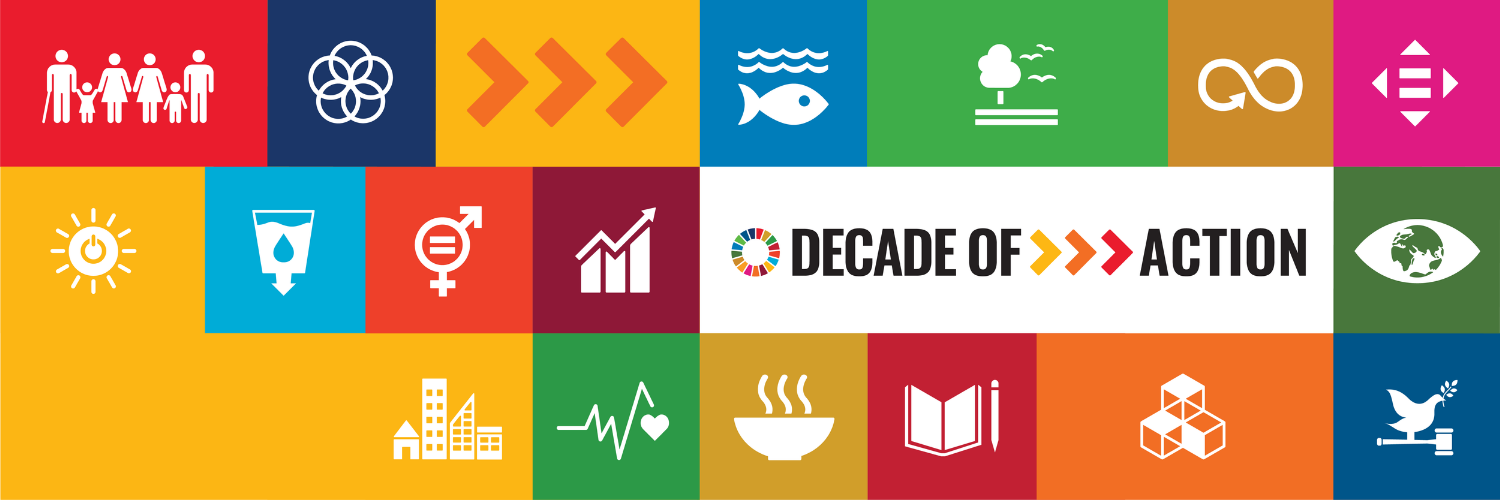Financing the SDGs
In 2021, UNCT intensified its efforts in support of creating solid partnerships and strengthening joint and inclusive actions to accelerate achievement of the 2030 Agenda and protect the needs and rights of the most vulnerable groups and those being left behind. The mobilisation of contributions to the SDG Acceleration Fund, mainly in response to the earthquake recovery and the pandemic, continued to be the main mechanism of resource mobilisation throughout the year. While maintaining the longstanding cooperation with Switzerland and Sweden, UNCT expanded and consolidated further its partnerships with the EU, and the governments of Austria, Croatia, Denmark, Italy, Netherlands, Finland, Norway, Poland and the UK.
Extending partnerships with the private sector was in the focus of UNCT’s work throughout 2021, while promoting the UN Global Compact (UNGC) and Women Empowerment principles (WEPs) and enhancing knowledge of the private sector around specific SDG goals and the available UNGC tools. Actions were complemented by awareness-raising efforts through conducting of several SDG advocacy initiatives, involvement of private partners in the broader UN sustainability framework, including the UN Global Compact, and development of knowledge instruments such as the SDGs Business Toolkit, jointly launched with the UN longstanding partner the International Chamber of Commerce (ICC), aiming at providing direction to business stakeholders in Albania on how to embrace the SDGs. Moreover, UNCT strengthened and extended private partnerships with other local and international chambers and business associations, including the Foreign Investors Association of Albania (FIAA), American Chamber of Commerce (AMCHAM) and Women Economic Chamber (WEC).

The 10 principles of the UN Global Compact
Likewise, UNCT under the leadership of the UN Resident Coordinator reinforced advocacy actions for the achievement of the SDGs through locally tailored partnerships and resource mobilisation initiatives. In December 2021, a Joint Declaration of Intent on cooperation in meeting the 2030 Agenda for Sustainable Development in Albania was signed with Vodafone Albania, as a strategic partnership framework that supports Albania’s drive to attain the SDGs. Similarly, six new partnerships were signed with private companies, part of a regional UNFPA project aiming to establish and promote gender-responsive family policies in the private sector in Albania. Lastly, bringing together the collective capacity of the UN agencies and aiming to further scale up the assistance in the private sector in Albania, and enhance support and improve understanding and engagement on the SDGs, the UN, through FAO, ILO, UNDP and UNIDO, and a contribution from the Swedish International Development Cooperation Agency (SIDA) mobilised new resources to develop the new project ‘Business Partnerships and Solutions for SDGs’ based on Swedish exchange of knowledge.
With the support of the government of Albania, the UN contributed to influencing and aligning investments towards the SDGs through the completion of several studies and assessments under the joint programme Support to SDG Financing, supported financially by the Joint SDG Fund.
- Analysis of SDG-related budgetary spending during 2015–2019 documents Albania’s efforts towards pursuing the SDGs through economic and social development policies and tracking of its public expenditure. Approximately USD 17 billion (ALL 1,990 billion), or 85 percent of total budget outlays between 2015 and 2019 (from domestic and foreign sources) have contributed towards the achievement of SDG-related targets in Albania. The main cost driver for the overall development strategy is social development and cohesion, which accounts for approximately half of the total budget for the 2015–2019 period. Tackling poverty and inequalities costs about 43 percent of all public resources in Albania, while another 21 percent of expenditure is allocated to health and education. The report also provides a deep dive into patterns, emerging trends and underlying factors for progress in two SDGs, related to the development of human capital and education and poverty, highlighting that increased spending levels are desirable, but not necessarily sufficient to achieve sustainable progress.
- Analysis of the impact of investment in childcare, the child and family on poverty reduction and human development investigates the fiscal space to increase spending upon childcare infrastructure by undertaking simulations of the investment for gender-disaggregated employment creation, poverty reduction and reduction in time on unpaid work. The study was able to quantify economically a broad range of benefits from investment in universal childcare. The costing exercise gives an indication of the main factors that influence costs and the relative trade-offs to make the investment.
- A study on the effectiveness and efficiency of the Social Cash Assistance Programme (Ndihma Ekonomike, NE) addresses i) coverage and adequacy for the number of beneficiaries, benefit level and expenditure as a percentage of Gross Domestic Product (GDP), ii) effectiveness, targeting accuracy, impact on poverty reduction, social inclusion, iii) eligibility criteria and the complaint and appeals mechanism, iv) impact on decentralisation, with municipal provision of NE and social services, v) impact of the reform with exit rules and the appropriateness of limiting NE eligibility to five years, and vi) recommendations for policy change.
- A feasibility study on long-term care in Albania, which analyses the current system of providing care for the elderly in view of the rapidly growing need due to ageing. The recommendations include measures to secure the workforce for providers facing a shortage of carers, partly due to the substantial levels of emigration, by an innovative mechanism of public-private partnership and a government–NGOs partnership.

The process of drafting the first Integrated National Financing Framework (INFF) for Albania was initiated in 2021. Liaising with technical staff at MoFE, a draft inception report and preliminary roadmap was prepared internally. Field work will begin in January 2022 and is expected to conclude in July 2022. Potential synergies between INFF and the process of drafting the new NSDI were discussed with the PMO, which proposed integrating the framework oversight mechanism into the existing Inter-ministerial Committee and Inter-institutional Working Group on SDGs. This would provide the appropriate political and technical fora for the INFF oversight.
MoFE has been supported in establishing a dedicated research unit for a data-driven and evidence-informed approach to policy making. The Policy Research Unit will conduct trend and macroeconomic analyses and modelling, provide input to monitoring and evaluation for improved fiscal management and economic development, and produce actionable policy recommendations. A team of four (1 team leader and 3 junior consultants) was recruited in Q4 2021 and will begin working with the Minister’s cabinet in January 2022 to identify impending research priorities.
The UN joint programme “EU for Gender Equality in Albania—Implementation of the EU Gender Equality acquis”, which started implementation in 2021, has a particular significance for the UN in Albania not only due to its strategic importance but also as a model of partnership of the UN and the EU when it comes to promoting gender equality and ensuring that national policies and standards promote women’s full enjoyment of their human rights. Through this project, for the first time, the EU has agreed to share its contributions through the Albania SDG Acceleration Fund, which mirrors the importance that the EU attributes to the principle of Delivering as One and of interagency coherence and collaboration. These efforts in support of SDG 5 on gender equality will continue during the implementation of the new UNSDCF 2022-2026, which includes a dedicated outcome on gender equality and women’s empowerment.


